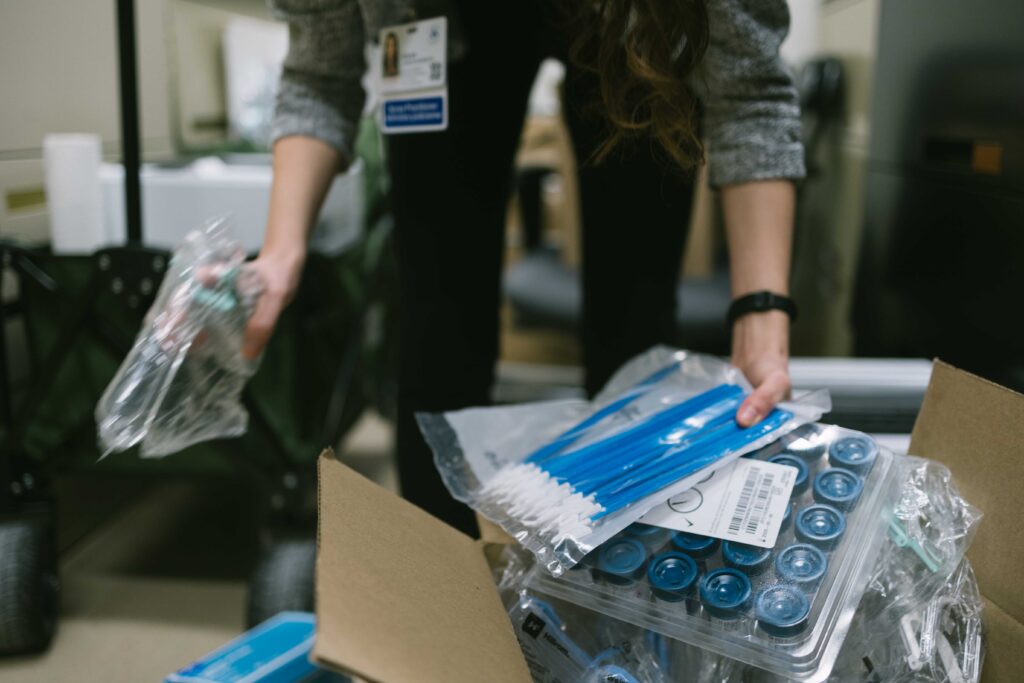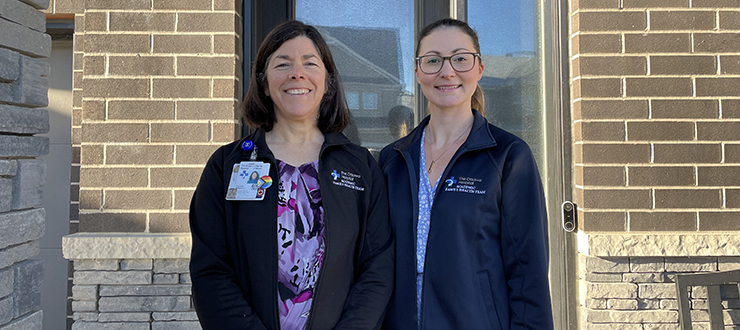
Meet Nurse Practitioner Sarah Junkin-Hepworth, the Champlain Screening Outreach Program’s “Superscreener.”
Regular cancer screening can help save lives. But for people without a family doctor, accessing these important services can be a major challenge.
That’s why the Champlain Regional Cancer Program at The Ottawa Hospital launched the Champlain Screening Outreach Program. The first of its kind in the province, the program offers cancer screening services for people living in Eastern Ontario who do not have a primary care provider.
Since the program began in July 2023, Nurse Practitioner Sarah Junkin-Hepworth has screened hundreds of residents across the region for breast, cervical, colorectal and lung cancer.
“Patients have told me they are relieved to finally get the care they’ve been trying to get for some time — and often have been late to get for many years,” reports Sarah. “For me, it’s really rewarding to break down a barrier for somebody and open a door for them.”
Want to learn how Sarah can open a door for you? Find out more about the program from the “Superscreener” herself…
Why should I get screened for cancer?
“Keeping up with regular screenings helps detect cancers early, before signs or symptoms develop. And when we catch cancers at an earlier stage, it means two things: Typically, we are able to use less invasive treatments to manage the disease, and the second thing is that we have better success rates with those treatments. I’ve found that about 43 per cent of the tests I’ve ordered are for people who were overdue for their screening.”
How does the program work?
“The first step is to book a 30-minute phone call with me (more on how to book an appointment below). During our call, I’ll ask you about your lifestyle, personal history and family history to find out which cancer screening tests you’re eligible for. I screen for the four cancers that have organized provincial screening programs: breast, cervical, colorectal and lung cancer. I’ll then make the referrals for the tests and update you on the results when they come back. And if you need a Pap test, I can perform the test myself.”

What if I don’t live in Ottawa?
“No problem! Though I’m based in Ottawa, I can provide referrals for tests that can take place anywhere throughout the Champlain region. Let’s say you live in Pembroke and want to receive a mammogram in your own community. You can book a virtual appointment with me, and I can refer you for the test at the Pembroke Regional Hospital.
“If you need a Pap test, I mostly perform them at The Ottawa Hospital’s Hampton Park Plaza breast screening clinic, but if you’re outside Ottawa, I still may be able to see you at one of the Pap test clinics that the Champlain Screening Outreach Program runs throughout the region. Or I can direct you to a clinic run by our community partners who can see you closer to home.”
How do I know if I qualify for this program?
“You must reside in the Champlain region, have an Ontario Health Insurance Program (OHIP) card, be without a primary care provider (family doctor or nurse practitioner) and meet the age or family history requirements of Ontario’s cancer screening programs. Check out the table below for more details.”
| Type of cancer | Who should be screened | Test | How often |
| Breast | Age 40+, for women, two-spirit, trans and non-binary people with breasts | Mammogram | At least every 2 years |
| Cervical | Age 25 to 70, if you have a cervix | Pap test | Every 3 years |
| Colorectal | Age 50 to 74 | At-home stool test, also called a fecal immunochemical test (FIT) | Every 2 years |
| Lung | Age 55 to 74, if you were/are a smoker | Low-dose computed tomography (low-dose CT scan) | Annually |
“The above table is for people at average risk of developing these cancers — for example, no family history of these cancers. When we have our phone chat, I’ll ask you some questions to see if you qualify for high-risk cancer screening. So, if you have a close family history of one of these cancers, you may need to be screened more often and at a younger age and even have a different test, which I can also order for you.”
How do I make an appointment with you?
“It’s super easy! First, please take a moment to review our consent form. Then you can book your appointment online. And if you have any more questions about the program, I’m happy to answer them during our call.”

Support patient care and research at
The Ottawa Hospital
You might also like…
The Ottawa Hospital and YouTube Health partner to increase access to health information in Canada
Looking for health information online can lead you down a rabbit hole of misinformation. That’s why we’ve launched a series of videos with YouTube Health. Presented in both English and French by experts from across The Ottawa Hospital, these videos cover everything you need to know about an array of common medical conditions.
New gender-affirming surgery clinic now accepting patients
The Ottawa Hospital’s new gender-affirming surgery clinic is truly one of a kind. Launched in September 2023, it’s the only clinic in Ontario to offer trans and non-binary patients facial, top and bottom procedures. Plastic Surgeon Dr. Nicholas Cormier and his team are happy to announce that they are now accepting patient referrals from physicians.
Patient gifts a piece of home to Indigenous Cancer Program
Inuit patients can now see and hold a piece of their traditional territory in the Windòcàge Room at the General Campus, thanks to an interactive gift donated to The Ottawa Hospital by a cancer patient.
A team from The Ottawa Hospital helps organize first-ever oncology conference in the North
When it comes to cancer treatment, there’s no place like home. This spring, a team from The Ottawa Hospital helped organize Nunavut’s first-ever oncology conference to figure out how to bring oncology care closer to home for patients.
“Stewards of hormones”: Our Gender Diversity Specialty Clinic guides medically complex patients on their affirmation journey
Often, trans and non-binary patients struggle to find health-care providers to support them on their affirmation journey. It is even more difficult for patients with complex medical needs. That’s why we launched our Gender Diversity Specialty Clinic, one of the first of its kind in Canada.
Type 2 diabetes: Are you at risk?
Type 2 diabetes is a serious health condition that affects nearly two million Canadians (and rising), but there are actions you can take today to reduce your risk. Our experts offer evidence-based tips on how to support your body’s blood sugar balance system and keep yourself healthy.


 To reset, hold the Ctrl key, then press 0.
To reset, hold the Ctrl key, then press 0.






Comment on this post